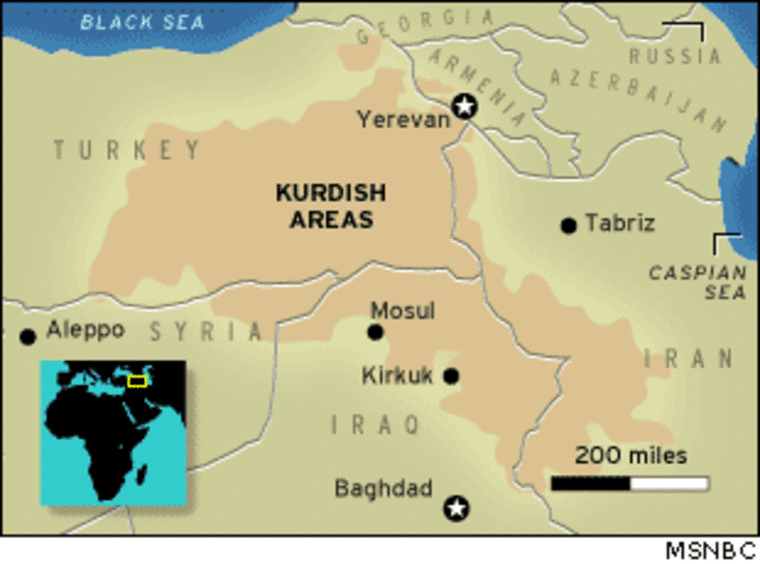The Iraqi elections set for Jan. 30 will be decisive for Iraq's history, but they may turn out to be divisive as well for Iraq's Shiites, Kurds and Sunnis.
The elections are not final, but they will set the character of the emerging state.
On election day Iraqis will select 275 members of parliament, who will then have the duty of writing a permanent constitution, answering fundamental and volatile questions including the role of Islam in the state and, critically, the power of the central government over the regional provinces — the equivalent in American history to the framers debate about states’ rights vs. national supremacy.
Once the constitution is written and ratified in a national referendum, new elections are scheduled to be held at the end of 2005 based on the document.
Shiites looking to seize majority rule
It’s safe to say that the majority of Iraqi Shiites appreciate the American gift of "democracy," which many of them oversimplify to mean strict majority rule.
Estimated to be 60 percent of Iraq's population, Shiites — especially the once-oppressed, now- invigorated clergy — are convinced the elections will sweep them to power.
The most senior Shiite religious leader, the grand Ayatollah Ali al-Sistani, issued a fatwa (religious edict) declaring that voting is more important than praying and fasting during the sacred Muslim month of Ramadan, and said women should divorce their husbands if they prevent them from going to the polls. This is extraordinary.
For religious Shiites — the vocal majority in Iraq — this is a historical moment, a chance to regain power in Mesopotamia lost with the death in the middle of the 7th century of their first imam, Ali ibn Abi Talib, son-in-law of the Prophet Mohammed, in Kufa, a city in modern Iraq near Naiad.
There are also undeniable regional implications of the emergence of a Shiite-led Iraq.
Iranian influence
Iran, the world’s leading Shiite power, is clearly excited about the prospect.
It has reason to expect to have friendly relations with the future Iraqi Shiite leaderships. Abdel Aziz al-Hakim — the top politician whose house was destroyed near our news bureau last week — was the leader of a militia trained by the Iranian government before he came to Iraq, from Iran where he was living, after the fall of Saddam’s government.
Al-Hakim has already suggested that cash-strapped Iraq should pay Iran reparations for the Iran-Iraq war (1980-1988).
The Sunni countries, nearly all of them Arab, are nervous about having a new Shiite neighbor. Jordan’s King Abdullah for one has accused Iran of trying to create a Shiite "arc" of hegemony and of allowing one million Iranian Shiites to cross the border into Iraq to vote.
Kurds seeking independence
The Kurds, for their part, have been struggling for independence since at least World War I when the British glued together the defeated Ottoman provinces of Basra, Baghdad and Mosul and named them "Iraq."

Like the Shiites, this is a historical moment for Kurds in Iraq. Making up roughly 15 percent of the population, if the Kurds win enough seats in parliament, they hope to codify their autonomy in law. In Iraq’s future parliament, the Kurds will be pushing for a great deal of freedom to act apart from the central government.
Like the Shiites’ ascendancy, the growing autonomy of the Kurds is also felt regionally.
After World War I, the Ottoman province of Kurdistan was divided among Iran, Turkey, Iraq and Syria. Since then, the central governments of each of these states has worried that Kurdish nationalism — at times in the form of armed revolts — could undermine its authority.
Today, these states, foremost among them Turkey, are uncomfortable with the de-facto creation of a Kurdish state; it’s a source of tension in the region which is not being addressed.
Sunnis trying to regain legendary past
The Sunnis of Iraq once ruled much of the civilized world. Their Abbasid Empire (750-1258) with its capital in Baghdad, “the city of peace,” was a crowning moment in Islamic history.
Abbasid palaces, filled with poets, musicians and intrigue, are still legendary today, captured in the fantastic tales of "The 1001 Arabian Nights." The descendants of this storied tradition, the Arab Sunnis of Iraq, 20 percent of the population, are acutely aware of their past glory and the fact that they have ruled the land of the Tigris and Euphrates rivers almost without interruption from the legendary Abbasid caliph Haroun al-Rashid to Saddam Hussein.
It’s therefore not surprising why so many Sunnis are fearful about the elections, and why Sunnis make up the core of the insurgence, especially when considering that many of the militants are former members of Saddam's security services who oppressed the now-vengeful and empowered Shiites and Kurds.
Iraqis discuss these divisions in their society every day, but, troublingly, the American officials in Iraq seldom do.
It seems Iraq's problems are unlikely to be resolved until actions are taken, or at the very least discussions begin, at home and with Iraq's neighbors about the Sunnis' disenfranchisement, the Shiites' newfound religious political and religious zeal, and the Kurds' national aspirations. Only then can there be national and regional reconciliation.